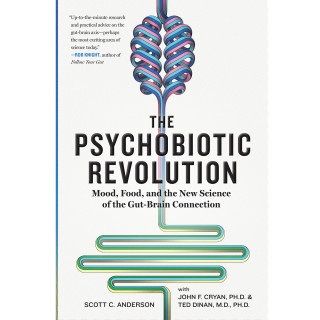The Chart That Could Help Improve Your Gut Health
The author of The Psychobiotic Revolution shares a simple way to have a happier gut—and mood.

Photo: Lisovskaya/iStock
Perhaps you have seen the Food Guide Pyramid used by the U.S. Department of Agriculture (USDA) to represent a balanced diet. Here's a variation on that model, a psychobiotic pyramid, that conveys how to get the proper proportions of good mood food, including probiotics.
The main message of this graphic is that by far the biggest psychobiotic contributor to your diet should be leafy greens and vegetables. Fruits, nuts and berries are important, as are fish and fermented foods. You should consider probiotic supplements an important but a relatively small player in the mix of what you eat for gut health and good mood.

Like the traditional dietary pyramid, this one visualizes the foods that will nourish a healthy microbiota. Eat plenty of those at the base—these foods represent the foundation of a psychobiotic diet—and proportionally less of those in the smaller sections at the top.
Adjusting your menu and including psychobiotic supplements in your daily routine are two essential steps toward gut health and, with it, a better mood. Here are more changes you can make in your daily routine to enhance the process. Nothing is an instant fix. Your microbiota changes constantly, but big-picture population shifts, and the mood changes that can come with them, take time. A lot of variables are involved with psychobiotic balance, including diet, exercise, genetics, immunity and hormones. It's an exquisitely complex system, and your success will depend on keeping all of these factors in top shape. The odds are good that you will start to feel better after just two weeks of this healthy, anti-inflammatory diet. For good measure, you may even lower your blood pressure and lose weight. Reshape your habits in these directions, and you will be doing yourself—and the microbes inside you—a service.
You can help yourself by adding new foods to the menu, but first, you need to stop eating the bad ones. That, in fact, may be all it takes to make you feel better. What do we mean by junk food? Think processed meat (hot dogs, sausage), refined grains (white bread, cake, pancakes, cookies), sweets (cola, sweetened fruit juice, ice cream, candy bars, ice pops, jam), and salty snacks (cheese puffs, potato chips). In other words, a delicious all-American diet.
Junk food affects your mood—and your microbiota. Studies have shown that foods with added sugar can induce depression, possibly by boosting pathogenic bacteria. Prebiotics have been shown to moderate this effect. A large Norwegian study with 23,000 women and their children found that a junk food diet predicted depression and anxiety in the children. It wasn't just the kids' diets; children born to mothers who ate a junk food diet when they were pregnant had more psychological problems. Another Norwegian study of 5,700 people showed a direct connection between a poor diet and depression and anxiety. These are big, significant studies that are hard to ignore.
Just to get you off on the right footing, a healthy diet consists of vegetables, fruit, fish, high-fiber grains, nuts, eggs and quality vegetable oil. These are elements of both the Nordic and Mediterranean diets, known to add healthy years to your life. These diets are also, fortunately, very tasty. So put down the corn puffs and pick up some nuts. Yes, it can start that simply.
 From The Psychobiotic Revolution by Scott C. Anderson. Copyright © 2017 by Scott Charles Anderson. Excerpted with permission by National Geographic.
From The Psychobiotic Revolution by Scott C. Anderson. Copyright © 2017 by Scott Charles Anderson. Excerpted with permission by National Geographic.



